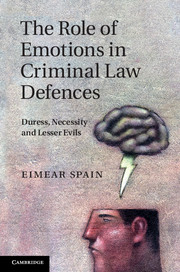5 - Threats and the taking of life
Published online by Cambridge University Press: 07 October 2011
Summary
The concerns which surround the recognition of duress and necessity as general defences in the criminal law are heightened when the availability of the defences to a charge of murder is considered. There has been much debate over the years on this controversial topic, focusing on why offences which involve the taking of human life should be singled out for special consideration. Particular to the offence of murder is a concern about the sanctity of life but there is also general concern about allowing an offender to depart from the strictures of the law in these circumstances, and it is not done lightly. The foundation for the exclusion of murder from the ambit of the defences must be ascertained in order to validate the exception and, significantly, to clarify just where the line is drawn.
Although the debate over the years has taken place in the absence of a consideration of emotions, the broad concerns remain the same and include the supreme importance of human life. A strict interpretation of the sanctity of life principle would suggest than a human being never has the right to take another life. However, exceptions to this general rule have been acknowledged almost universally for many centuries. The most obvious example in the criminal realm is the doctrine of self-defence. Various interpretations of the doctrine, which allows a full defence to one who takes a human life in self-defence, are put forward, including the recognition of a right to kill contingent upon the need to save one's own life. An alternative, the forfeiture doctrine, suggests that the victim, by virtue of his or her status as aggressor, concedes his or her right to life in favour of the right to life of the defendant. Of concern in this book is whether the sanctity of life principle requires that those who kill under duress or due to necessity, in situations where the victim does not play the role of aggressor, should suffer conviction and punishment.
- Type
- Chapter
- Information
- The Role of Emotions in Criminal Law DefencesDuress, Necessity and Lesser Evils, pp. 210 - 261Publisher: Cambridge University PressPrint publication year: 2011



